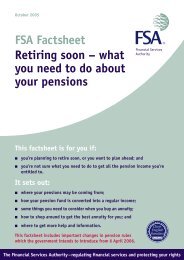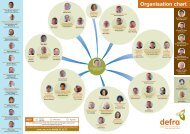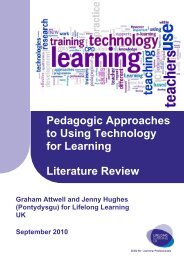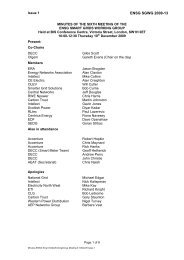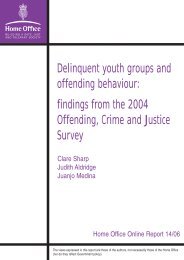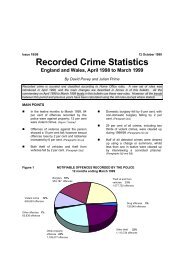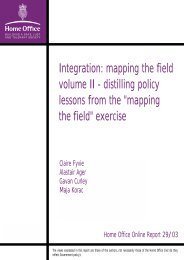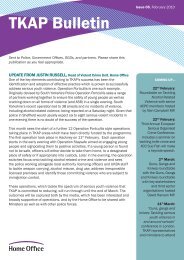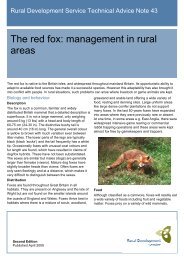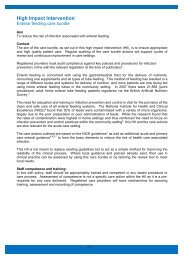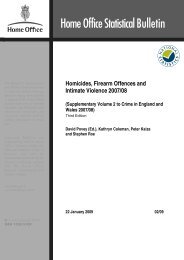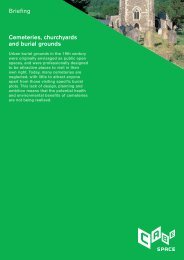Sexualistation of Young People
Sexualistation of Young People
Sexualistation of Young People
You also want an ePaper? Increase the reach of your titles
YUMPU automatically turns print PDFs into web optimized ePapers that Google loves.
Sexualisation <strong>of</strong> <strong>Young</strong> <strong>People</strong> Review<br />
76<br />
High levels <strong>of</strong> sexist bullying in schools<br />
suggest that schools must do more<br />
to meet the ‘Be healthy’ and ‘Stay safe’<br />
outcomes <strong>of</strong> Every Child Matters, 414 to<br />
fulfil their duty to promote well-being and<br />
to safeguard their pupils. There is evidence<br />
which suggests teachers do not feel<br />
confident to challenge the discriminatory<br />
attitudes and behaviours that underpin<br />
violence against women and girls. Teachers<br />
should therefore be given a much greater<br />
level <strong>of</strong> support and guidance. I therefore<br />
recommend that:<br />
• The Department for Children,<br />
Schools and Families (DCSF) issues<br />
statutory guidance for schools on<br />
gender equality, in order to raise the<br />
pr<strong>of</strong>ile <strong>of</strong> the issue. The new guidance<br />
should be comprehensive, including:<br />
how to address gender equality and<br />
violence against women and girls in<br />
the school Gender Equality Scheme;<br />
the school ethos; in anti-bullying<br />
policies; safeguarding strategies; the<br />
wider curriculum; staff training; and<br />
the services and information that<br />
schools provide.<br />
• Schools should ensure that all<br />
incidents on sexual bullying are<br />
recorded and reported separately to<br />
other forms <strong>of</strong> bullying.<br />
ii) Statutory Personal, Social, Health and<br />
Economic (PSHE) education and Sex and<br />
Relationships Education (SRE)<br />
As part <strong>of</strong> the Violence Against Women<br />
and Girls consultation, I recommended<br />
that PSHE education, which includes<br />
SRE, become a compulsory part <strong>of</strong><br />
the curriculum. Ministers have already<br />
indicated that this is their intention. SRE<br />
provides important opportunities for<br />
children and young people to develop the<br />
language and skills they need to be safe<br />
and to understand personal relationships.<br />
SRE should begin in primary schools and<br />
continue throughout secondary school.<br />
414 www.everychildmatters.gov.uk<br />
It should include setting personal<br />
boundaries and understanding what is safe<br />
and appropriate touching and behaviour. It<br />
should also look at issues like body image<br />
and violence in relationships and aim to<br />
help young people develop an awareness<br />
<strong>of</strong> the gap between pornography and real<br />
sexual relationships. It is imperative that<br />
all children receive this level <strong>of</strong> education<br />
and guidance including children with<br />
learning difficulties, who <strong>of</strong>ten miss out<br />
because <strong>of</strong> their special educational needs.<br />
It is also important that teaching staff are<br />
equipped to deliver high-quality teaching<br />
about personal relationships which tackles<br />
sexualisation and that responds to the<br />
realities <strong>of</strong> children and young people’s<br />
lives. I therefore recommend that:<br />
• Clear reference is made to<br />
sexualisation, gender stereotypes and<br />
pornography within the Department<br />
for Children, School and Families’<br />
revised Sex and Relationships<br />
Education (SRE) guidance which is<br />
currently out for public consultation.<br />
• Practical ‘How To’ guidance on<br />
tackling sexualisation is disseminated<br />
widely to schools through<br />
Teachernet, the PSHE Association,<br />
the Sex Education Forum and other<br />
agencies. This would pull together<br />
illustrative material <strong>of</strong> good practice;<br />
demonstrate how sexualisation can<br />
fit within the existing curriculum<br />
including SRE, PSHE education,<br />
Citizenship and Media Studies; and<br />
detail what resources are available<br />
and links to relevant organisations.<br />
• New SRE resource materials are<br />
made available for teachers who<br />
work with children with special<br />
education needs and learning<br />
difficulties.<br />
In many schools, effective work is already<br />
under way in the areas <strong>of</strong> violence against<br />
women and girls and gender equality.<br />
This includes lessons given as part <strong>of</strong> the



